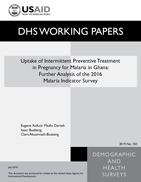- PUBLICATIONS
- JOURNAL ARTICLES
- ACCESS PUBLICATIONS
Publications Summary
- Document Type
- Working Papers
- Publication Topic(s)
- Malaria, Maternal Health
- Country(s)
- Ghana
- Language
- English
- Recommended Citation
- Darteh, Eugene Kofuor Maafo, Isaac Buabeng, and Clara Akuamoah-Boateng. 2019. Uptake of Intermittent Preventive Treatment in Pregnancy for Malaria in Ghana: Further Analysis of the 2016 Malaria Indicator Survey. DHS Working Paper No. 158. Rockville, Maryland, USA: ICF.
- Download Citation
- RIS format / Text format / Endnote format
- Publication Date
- July 2019
- Publication ID
- WP158
Download
 Uptake of Intermittent Preventive Treatment in Pregnancy for Malaria in Ghana: Further Analysis of the 2016 Malaria Indicator Survey (PDF, 342K)
Uptake of Intermittent Preventive Treatment in Pregnancy for Malaria in Ghana: Further Analysis of the 2016 Malaria Indicator Survey (PDF, 342K)
